 Petzlover
Petzlover Chihuahua is originated from Mexico but Akita Inu is originated from Japan. Chihuahua may grow 48 cm / 18 inches shorter than Akita Inu. Chihuahua may weigh 35 kg / 77 pounds lesser than Akita Inu. Chihuahua may live 5 years more than Akita Inu. Chihuahua may have less litter size than Akita Inu. Chihuahua requires Low Maintenance. But Akita Inu requires Moderate Maintenance
Chihuahua is originated from Mexico but Akita Inu is originated from Japan. Chihuahua may grow 48 cm / 18 inches shorter than Akita Inu. Chihuahua may weigh 35 kg / 77 pounds lesser than Akita Inu. Chihuahua may live 5 years more than Akita Inu. Chihuahua may have less litter size than Akita Inu. Chihuahua requires Low Maintenance. But Akita Inu requires Moderate Maintenance
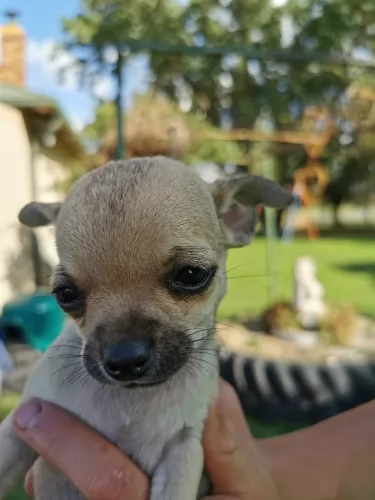 Quite a bit of the Chihuahua’s history is shrouded in mystery, and there are different versions about its origins.
Quite a bit of the Chihuahua’s history is shrouded in mystery, and there are different versions about its origins.
While historians speculate, most will agree that the tiny dog hails from Mexico. The UK Kennel Club considers the smooth- and long coat Chihuahuas as 2 distinct breeds.It was in 1904 that the Chihuahua became a registered breed by the American Kennel Club.
Chihuahua is actually the name of a state in Mexico, and it is amazing that Chihuahua specimens were found way back in the 1800's already. Today the Chihuahua is a very popular dog breed in several countries.
 The Akita Inu, originating from Japan's snowy Akita Prefecture, has a long-standing legacy as a powerful hunting dog and loyal companion. Bred in the 1600s to track large game like boar and bear, the Akita quickly earned its place among Japanese nobility as a guardian and symbol of courage.
The Akita Inu, originating from Japan's snowy Akita Prefecture, has a long-standing legacy as a powerful hunting dog and loyal companion. Bred in the 1600s to track large game like boar and bear, the Akita quickly earned its place among Japanese nobility as a guardian and symbol of courage.
Its dignified nature and unwavering loyalty were immortalized in the true story of Hachikō, an Akita who waited nearly a decade for his deceased owner at a Tokyo train station. This devotion captured national and global admiration, leading to the breed’s recognition as a national treasure in Japan.
After World War II, American soldiers introduced Akitas to the West, giving rise to a larger, more robust variation known as the American Akita. Today, the Akita Inu remains a cherished breed worldwide for its strength, loyalty, and quiet dignity.
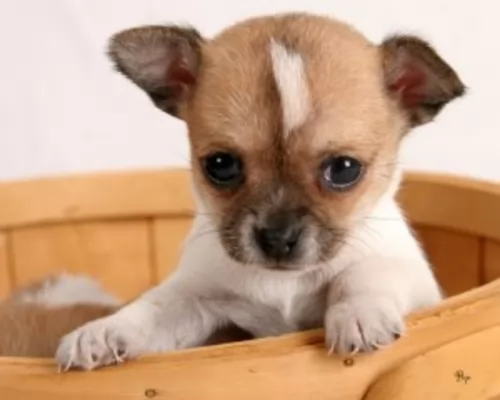 The small Chihuahua stands at about 15 – 23 cm and he weighs about 1,5 – 4kg.
The small Chihuahua stands at about 15 – 23 cm and he weighs about 1,5 – 4kg.
You’ll notice that he shivers when he is excited or when he is cold or frightened. Some people buy him a jersey to don on cooler days. With this tiny toy dog, you get a short- and a long coated Chihuahua.
This is the smallest dog breed and his coat is available in a number of colors such as fawn, tan, white and black. It is the dog’s round apple-shaped head which is a distinctive feature. He has erect ears and huge fruit-bat type eyes.
The Chihuahua is such an alert, fun-loving, feisty little dog, and though he may appear to be an ideal pet for children, he actually isn’t. He is too dainty and frail, and a child, during play, could accidentally crush him.
It’s a pity though because he just loves being around his human family. He is also a highly strung dog, and given the chance, he’ll nip and even bite during games. It is why socialization and training are considered important for the Chihuahua.
Just like with children, how you raise and treat your Chihuahua will determine how he turns out. He is such a sweet little dog that training and socialization can remove these unwanted characteristics. He is very intelligent and responds well to training.
 The Akita Inu is a large, powerful, and dignified dog breed known for its striking appearance, quiet nature, and unwavering loyalty.
The Akita Inu is a large, powerful, and dignified dog breed known for its striking appearance, quiet nature, and unwavering loyalty.
Originating from Japan, it has a broad head, erect triangular ears, and a plush double coat that comes in red, white, brindle, or sesame, with characteristic urajiro (whitish markings). The Akita carries itself with pride and confidence, often aloof with strangers but deeply affectionate and protective toward its family.
Calm, intelligent, and strong-willed, the breed requires early socialization and firm, consistent training. Though not ideal for first-time owners, the Akita Inu is a loyal guardian and devoted companion for those who understand and respect its independent spirit.
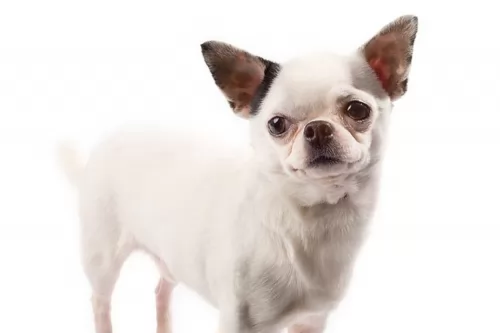 Small and feisty, the Chihuahua’s personality isn’t set in stone, and the tiny dog can be either shy and timid or he can be social, confident and jaunty.
Small and feisty, the Chihuahua’s personality isn’t set in stone, and the tiny dog can be either shy and timid or he can be social, confident and jaunty.
They're always loyal and affectionate to their human owners, but they don’t get on too well with- and are wary of small children who aren’t disciplined and who could hurt them.
With his big eyes and big ears together with his comical antics, they can be a source of entertainment for their human owners. He is easy to train too and even though he is small, he doesn’t think he is, and he is willing to use his big personality to make you a loving, loyal and devoted companion.
 The Akita Inu is a large, noble, and powerful breed known for its dignified presence, strong loyalty, and quiet confidence. Originally bred for hunting and guarding, Akitas are naturally protective, courageous, and independent thinkers.
The Akita Inu is a large, noble, and powerful breed known for its dignified presence, strong loyalty, and quiet confidence. Originally bred for hunting and guarding, Akitas are naturally protective, courageous, and independent thinkers.
They form deep bonds with their family but are often aloof with strangers. Calm and clean by nature, they rarely bark without reason and carry themselves with elegance and strength.
Their double coat is thick and weather-resistant, requiring regular grooming, and they shed heavily, especially seasonally.
While intelligent, Akitas can be stubborn, so they thrive best with experienced owners who can offer consistent training and leadership. With proper care and socialization, the Akita Inu is a devoted, majestic companion.
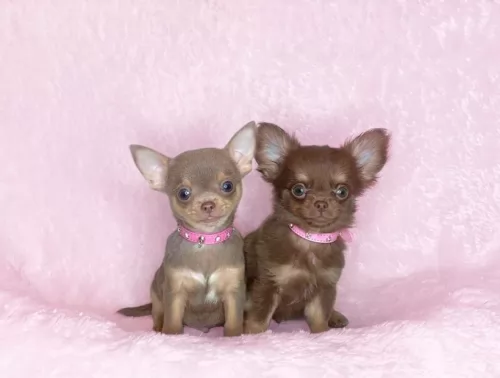 The Chihuahua doesn't have any particular health issues, more so when you get him from a reputable breeder. With good care he can reach 20 years of age.
The Chihuahua doesn't have any particular health issues, more so when you get him from a reputable breeder. With good care he can reach 20 years of age.
Known as low blood sugar, hypoglycemia is easily treatable, but if it isn’t caught early it can be fatal.Hypoglycemia makes a dog lethargic and he’ll shiver and could go into a coma. Get him to the vet immediately.
Gastric Dilatation or bloat is when the stomach twists, it becomes enlarged and blood supply is cut off to the stomach. Left untreated, it can be fatal.
Chihuahuas are susceptible to dental problems, so you will need to brush his teeth 2 or 3 times a week to prevent tartar build-up, gum disease, loss of teeth and other diseases.
 The Akita Inu is generally a strong and resilient breed, but it is prone to several genetic and breed-specific health issues.
The Akita Inu is generally a strong and resilient breed, but it is prone to several genetic and breed-specific health issues.
Common concerns include hip and elbow dysplasia, progressive retinal atrophy (PRA), and hypothyroidism, all of which can affect mobility, vision, and metabolism.
The breed is also susceptible to autoimmune disorders like VKH-like syndrome and sebaceous adenitis, a skin condition causing hair loss and irritation. Additionally, Akitas may experience bloat (gastric torsion), a life-threatening emergency common in deep-chested dogs.
Regular veterinary care, proper diet, and responsible breeding practices are essential to help minimize health risks and ensure a long, healthy life.
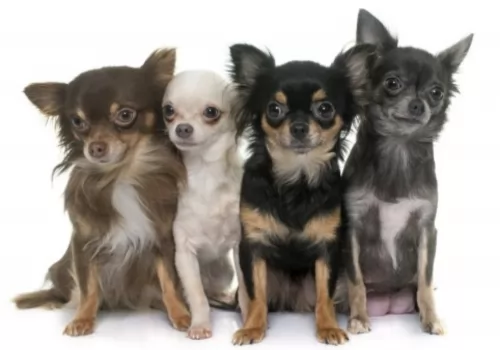 Always make sure to choose a high-quality dog food for your Chihuahua as this will keep him in tip-top health. A healthy Chihuahua can live to be 20 years of age. Speak to a veterinarian for recommendations on the best type of food to feed your tiny pet.
Always make sure to choose a high-quality dog food for your Chihuahua as this will keep him in tip-top health. A healthy Chihuahua can live to be 20 years of age. Speak to a veterinarian for recommendations on the best type of food to feed your tiny pet.
Giving him some home-made food such as brown rice, vegetables and cooked chicken for instance will be a welcome treat for him. Make sure he always has a bowl of fresh, cool water close by.
The Chihuahua may well be the smallest toy sized dog breed, but don’t be mistaken – he has plenty of energy and is constantly prancing around. He is more than capable of living in a small apartment, but even so he needs to be taken outside every now and then for a game or a walk.
Be careful with your small pet though, as too much exercise can lead to elbow- and hip dysplasia.
The Chihuahua is a moderate shedder with Spring being their heavier shedding period. Because of his small size, you won’t be bothered by too much hair. The short haired Chihuahua is easy to maintain and with a rubber brush, you can brush him gently twice a week.
You’ll also need to clip his nails and if you can’t manage this your vet can also help you.
 Caring for an Akita Inu involves commitment, consistency, and understanding of the breed's unique needs. They require regular grooming, especially during seasonal shedding, with brushing at least 2–3 times a week and daily during coat blow periods.
Caring for an Akita Inu involves commitment, consistency, and understanding of the breed's unique needs. They require regular grooming, especially during seasonal shedding, with brushing at least 2–3 times a week and daily during coat blow periods.
Akitas thrive on routine exercise, such as long walks or playtime in a secure area, but they aren’t overly energetic. Training and socialization should start early, using positive reinforcement and calm, firm leadership to manage their independent and protective nature.
They are best suited to homes where they are the only pet or properly introduced to others. Akitas are clean, quiet, and typically bond closely with their family, so providing mental stimulation, affection, and clear boundaries is key.
Regular vet checkups, a balanced diet, and proper social interaction help keep your Akita healthy, happy, and well-adjusted.